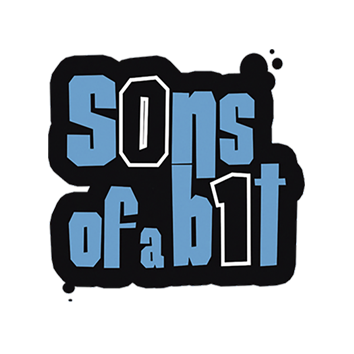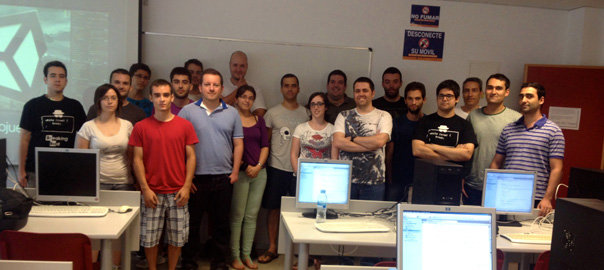Last month, from July 14th to 25th, I taught a 30 hours intensive course called “Make Videogames with Unity” (“Desarrollo de Videojuegos con Unity” in Spanish) at the Faculty of Computer Sciences of the University of Murcia (our hometown). I must thank the Faculty and all the students of the course – there were many of them, although it was carried out in the heat of summer – for letting me live this awesome and rewarding experience. In fact, I have enjoyed it so much that I think I have found a new vocation. So if the initiative takes place one more time – hopefully it will -, there’s no doubt I will take part of it again.
I spent many hours (and lost much sleep) planning the course and preparing class material, but it was worth the effort. My objective was very ambitious, maybe too much (and so I was told by a couple of professors), since I wanted to condense everything about Unity in 30 hours, without leaving nothing out and including some basic concepts about 3D modeling. It’s true that some lessons were a little bit intense, but I can’t be more satisfied with the result, the feedback from the students, the participation in class discussions and – overall – the feeling that this course has been really useful and it will help students work with Unity independently, learn the most important aspects of the tools of the software, its pros and cons, where to search for information when needed, etc.
For us, this first step taken by the Faculty of Computer Sciences of the University of Murcia to start to boost the development of video games is a very important one. As we wrote in our post at the blog Louesfera (text in Spanish), we think that educational institutions should look at the video game industry closer and realize it must be taken into account once and for all. Their passiveness is meaningless since this kind of formation is very much in demand right now. It is an industry that is growing and growing every day and will generate wealth and produce many jobs in the immediate future, so it should be encouraged and the problem of the absence of formation to make video games in most Spanish regions should be solved as soon as possible.
If people can’t be trained and learn how to make games professionally, how can this industry grow up in Spain? We don’t think it has nothing to do with the lack of ideas, talent and vocation…
Regarding all of this, something is changing at the University of Murcia, and at the Faculty of Computer Sciences to be more specific. It’s obvious that some kind of changes are taking place in this direction, which allows us to dream of a Master’s degree or a Specialist course on video game development. This would be another huge step in order to make the video game industry grow in Murcia and in Spain, specially if the creation of new small indie game studios through those courses was encouraged.
When the Faculty of Computer Science offered me the chance of taking part in this course, it was very surprising and exciting. I accepted without hesitations of course. It’s my personal crusade, since I can say I have two big dreams: 1) Releasing our first game on most platforms and being able to keep on living from this and 2) Helping make Murcia one of the most important cities regarding the development of video games, so people don’t have to leave the region to learn and work, something like what is happening in Valencia right now.
So we must continue working restless to reach our objectives. As William Faulkner said:
«The end of wisdom is to dream high enough to lose the dream in the seeking of it.»


